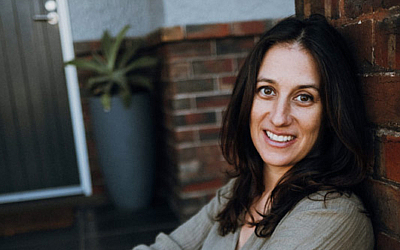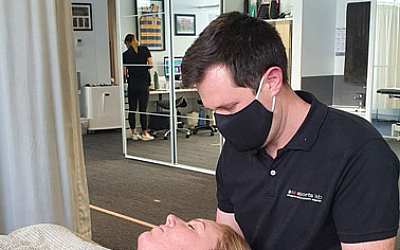Today is R U OK? Day. With many of us less than okay right now, a range of expert professionals offer some practical tips and advice for positive wellbeing.

Brenda Heideman
Psychologist
Top tips for your psychological wellbeing
On finding motivation
Brenda’s key message

Joel Gerschman
Business coach, author, entrepreneur The Change Coach
It is an understatement to say that people are “doing it tough” right now. Businesses across Australia – and the globe – are shedding staff, closing their doors or subsisting on government handouts. And the ramifications are far-reaching – both financially and emotionally.
Top tips for business success
- Cultivate a mindful mindset: Instead of reacting, operate mindfully. This means being deliberate and strategic about how you run your business and how you live your life. It requires thinking deeply about your goals, systematically planning how you’re going to achieve them and then deliberately executing on that plan. And while there are no guarantees in this new world order, a mindful approach is infinitely more likely to lead to success. Research reveals that CEOs and business owners are far more likely to experience mental health issues, meaning that running a business is often stressful at the best of times. So, the bottom line is: If you need it, step up to the plate and seek professional help now – your mindset is too crucial to ignore.
- Improve operational efficiency: In a 2010 study reported in the Harvard Business Review, researchers reviewed the performance of 4700 companies prior to, during and after three global recessions. 17 per cent of the companies did not survive. Of the survivors, 80 per cent had not regained their pre-recession sales and profit rates – even three years later. Only nine per cent flourished. They found that while cost-cutting is often necessary to survive, the top nine per cent cut costs through improving operational efficiency rather than by simply slashing employee numbers. In practice, improving operational efficiency means scrutinising every aspect of your business model – from how you’ve set up your supply chain to how your business is organised and structured, enabling you to reduce operating costs on a permanent basis. When demand returns, costs can stay low, allowing your profits to grow faster.
- Invest in growth: The other strategy employed by the top nine per cent was investing in growth. In particular, these companies invested in two key areas: they took advantage of lower prices to buy property, plants and equipment; and they increased spending on innovation and marketing. While it might sound counterintuitive at first glance, they’re actually wise moves. Investing in assets helps businesses during the recession and afterward, enabling them to respond faster to increased demand. And while marketing may only produce modest benefits during the recession, developing and cultivating new markets substantially increased profits afterward (when you can capitalise on all the relationships and goodwill created while every other business was hibernating).
Joel’s key message
There’s no doubt about it: we’re being scorched by the fires of a global meltdown. But just like one melts down gold, silver and other precious metals to fashion something far more beautiful and valuable, with the right mindset and the right strategic actions it’s possible to use this meltdown as an opportunity to re-fashion your business (and your life) for greater success.
Joel Gerschman is author of The Mindful Entrepreneur.

Dr Elise Bialylew
Meditation teacher, trained doctor and psychiatrist • Mind Life Project
EVERYONE is facing their own unique challenges right now. Many people are feeling on edge and relationship and mental health issues have become magnified in these circumstances of confinement.
Top tips for mindfulness
- Incorporating good self care habits is important, including healthy diet, adequate sleep, regular exercise, and staying connected to friends who understand you (and make you laugh).
- Mindfulness meditation can be a highly effective tool for reducing stress and overwhelm when done regularly (even in short time slots). Bring mindfulness to your day. Particularly for those in Victoria, notice when you’re falling into heaviness, victim mode, the intolerable sense of impatience, and maybe anger. This is just how it is right now and you can only control your own internal mindset and attitude. As Viktor Frankl famously shared, “Everything can be taken from a man but one thing: the last of the human freedoms – to choose one’s attitude in any given set of circumstances, to choose one’s own way.”
- Practising gratitude can be very helpful in shifting the mindset in a more positive direction. It’s during stressful times like this that our minds tend to be pulled towards negative rumination. We need to intentionally focus our attention on the good to balance out what’s called the “negativity bias” of the brain. A good habit to develop is to acknowledge who or what you’re grateful for at the end of each day.
Elise’s key message
The only constant in life is change. This universal truth has been known for millennia. Although there are days where it may be difficult to see the light at the end of the tunnel, this too shall pass. Keep reminding yourself of this in an active way. You can write it on sticky notes and place them wherever they’ll be visible as a reminder that this too shall pass. Although it can sometimes feel like there’s no end to this current challenge, there will be. Take one day at a time, or on a bad day, even one hour at a time.
Dr Elise Bialylew is author of The Happiness Plan.

Matthew Jacobson
Senior financial adviser ActOn Wealth
THE biggest financial struggle that I’ve observed has mostly been around the uncertainty of not knowing whether someone will still have work next week and what is going to happen with their employment. The stimulus packages have been a lifeline for many, but people are still being made redundant every day and don’t really know how the long the government will be able to provide assistance and to what extent.
Top financial tips
- Write a detailed budget. If you know where your money is going, you can put in place measures to reduce unnecessary expenditures and stay on top of it.
- Contact your financial institution or landlord. If you’re struggling with a mortgage, personal debt or paying rent, reach out to them as they may be able to offer assistance.
- Stay in contact with friends and family. Being isolated can have an impact on mental health, which when coupled with financial worries can be a big concern.
Matthew’s key message
We are fortunate to live in a country that has the resources and motivation to support us. The lockdowns won’t last forever, and there is support available if you are willing to reach out.

Terri Maister
Clinical dietitian and kitchen manager • Wolper Jewish Hospital
ACCESS to food this year and ensuring adequate nutrition has been difficult, especially for the elderly. Staying well-nourished with limitations in place is forever a consideration for the geriatric population, and this is now more applicable to the rest of Australia in the middle of the pandemic.
Top diet tips
- Plan ahead and consider how you can make different recipes with non-perishable items such as tinned food, legumes or frozen vegetables.
- Using tinned or frozen produce does not necessarily mean it’s less nutritious. This time gives us a great opportunity to explore vegetarian options which are still high in protein and can boost your immune system. Chickpeas, beans, lentils and tofu can be paired with wholegrains such as quinoa and brown rice to make a balanced meal. Whole grains and legumes are great for us but they tend to go unrecognised because people often don’t know how to cook with legumes. This time could be an opportunity to use these wholesome ingredients that have considerable evidence behind them in lowering cholesterol, reducing risk of heart disease, increasing blood sugar control and managing weight.
- Increase your natural vitamin and mineral intake through a variety of nutritious foods and 30 minutes of exercise in the sun each day, can boost your immunity and manage stress. Many people equate food with comfort and indulge on discretionary food to cope with stress. However, if you focus on nourishing your body by eating vegetables, wholegrains and quality protein throughout the day, you won’t find yourself craving high sugar and high saturated fat foods in the evening.
Terri’s key message
If you find yourself overindulging or not exercising or feeling anxious, be kind to yourself and know that these are unprecedented times, and there is no right or wrong. There is no answer but time and this will eventually pass.

David Cohen
Musculoskeletal physiotherapist Sports Lab
SINCE the onset of COVID-19, we can break down the type of injuries we’ve seen into three phases. In the first stage, everyone started to believe they were a marathon runner because that was the form of exercise they could do outside the gym, and we saw a lot of mechanical overload-based injuries. When everyone started working from home, we saw a number of wry necks and back pain because of the ergonomic setup. A lot of the time those issues came down to people not doing inconsequential exercise they would normally do. Now we have passed that phase because people have either settled into working from home and those back in the office have started to move more. Then, in Sydney, we saw the return to gym phase. People thought they could lift the same weight as they had done five months prior, and now we are starting to see more tendon-based injuries because of the sudden increase in loading. Melbourne may have a larger deconditioned population as a result of an increase in lockdown time.
Top tip for physical wellbeing
- Exercise helps to reduce stress levels and going for a walk is good for your health. If there is fear regarding going out, it’s a good idea to discuss what you can do at home with your health professional. Zoom telehealth is a possibility from the luxury of your own house. A therapist can jump online and insurance will pay for part of that session.
David’s key message
Society has got through worse in the past. We will get through this and we will be better for it long-term. We get to decide what sort of society we live in moving forward and we should do the utmost to ensure that health is front of mind all the time in our decision-making.

Sharon Tal
Counsellor, kinesiologist, author The Soul Alchemist
People are torn between fear, anxiety, stress and fear of the unknown. In relationships, it is make or break: If it was good, it will be better; if it was bad, it will be worse and break. This is the golden opportunity to work on your relationships. It’s all about communication, love and respect.
Top tips for mental wellbeing
- Go out for walks and absorb vitamin D, and if you can’t manage that, even just go into your backyard or nearest park and stretch.
- Meditate and create happy visualisations of places where you want to be. Try and keep a part of you in a happy place, no matter what. If you can’t think happy thoughts, go back to happy memories.
- We must keep the spirit high. Even if that means just watching comedies and feel-good movies.
- Find your motivation. Start with baby steps of discipline. Have a shower, don’t just stay in your PJs or tracksuit. Walk to your mailbox, then walk to the corner. And if you need to put on a lipstick, put it on. Just make yourself feel good. Create positive rituals, one step at a time.
Sharon’s key message
Follow the rules while you keep your spirit high. Don’t allow anyone or anything to break your mood.

Rabbi Daniel Rabin
Rabbi, counsellor • South Caulfield Hebrew Congregation
THERE has been a lot of worry over not being able to attend shule and observe life cycle events in a way that we typically would. We have held prayer services and events over Zoom, and many people have used this opportunity to connect spiritually. There are some members of the community who have never come to shule before now, so it has opened up a lot of ways for people to connect. But it has also had a negative impact on many of those who would come to shule regularly. Many have told me that as the months have continued they are struggling to daven at home and to find their usual inspiration.
Top tips for spiritual connection
- Don’t feel guilty if you’re not feeling so connected right now. This is important. Remember, we are in a crisis, so it is okay to feel like this.
- Find one thing a week that will help you to connect spiritually. It might be an online Kabbalat Shabbat service, or just praying by yourself.
- Find a mentor for spiritual guidance, if you can. Someone who you look up to and can have a chat with, whether it be your rabbi, rebbetzin, a friend that you know. Sometimes it is tough on your own. But if you have someone to talk to, that can be of great benefit.
Rabbi Daniel’s key message
We all have limited resources, and we just have to do our best to do what we can for ourselves, and if you have the extra strength, help others. Be proud of whatever you can achieve.
If you are struggling with your mental health, please see your GP.
For immediate support, call Lifeline on 13 11 14 or the Suicide Call Back Service on 1300 659 467.
WIDER COMMUNITY SERVICES
- Beyond Blue Coronavirus Mental Wellbeing Service: 1800 512 348, coronavirus.beyondblue.org.au
- MensLine Australia: 1300 78 99 78, mensline.org.au
- Black Dog Institute: blackdoginstitute.org.au
- SANE Australia: 1800 187 263, sane.org
- Headspace: 1800 650 890, headspace.org.au
JEWISH COMMUNITY SERVICES
MELBOURNE
- Jewish Care Victoria: (03) 8517 5999, jewishcare.org.au
SYDNEY
- JewishCare: 1300 133 660, jewishcare.com.au
- Jewish House: (02) 9386 0770, crisis line 1300 544 357, jewishhouse.org.au
BRISBANE
- JCareQld: 1300 133 660, jcareqld.com
- Gold Coast Jewish Community Services: 0412 377 488
- Queensland Jewish Community Services: 0423 194 737, qjcs.org.au
PERTH
- Jewish Care WA: (08) 9275 6743


comments